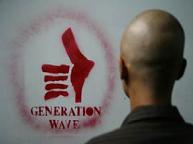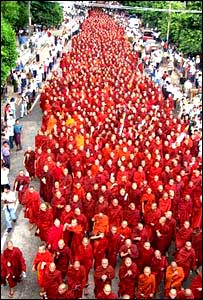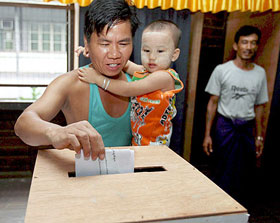Kong Janoi, IMNA : Decreasing landline prices and expanding phone services, both to be launched this week, are exciting potential customers all over Burma.
According to this week’s edition of Burma’s weekly Eleven journal, this week the Burmese government-controlled department of Myanmar Posts and Telecommunications (MPT)is launching a new reduced-price telephone landline service; the department is also adding another digit to Burmese phone dialing numbers, thereby upping the amount of daling numbers available to potential users around the country.
A Rangoon-based business magazine’s editor told IMNA that increasing demand within the country necessitated the need a for increased telephone services nationwide. The attractive price of the newly available landlines are also expected to attract even more interested customers.
“This landline is only a million kyat [1,000 USD] per head and [buyers] will get service three or four weeks after applying. Compared to in the past, [it would take] you three years at least to get service after applying and the price is about 2.5 million kyat [2,500 USD] per head. This one is relatively cheap and easy to apply for so many customers will [be interested] to buy it,” he said.
According to figures published by this week’s Weekly Eleven journal, there are currently only a little over 2 million [2,199,049] total phone owners in the whole of Burma; the country has a population of over 50 million people.
The reason for the service expansion is unknown. A political analyst in Rangoon told IMNA, “It is strange that the government is now opening up communication service, because before they didn’t want civilians to use such a communication tool. By using this tool they [the government] think that people will communicate with the outside world and [start] telling what they have been suffering in this country.”
Phone service expansion has in the past been attributed to government attempts to raise funds for the upcoming national elections, recently set for November 7th. A source quoted in a June 18th, 2009 article published by The Irrawaddy news magazine linked phone service expansion to the Burmese government’s inadequate budget, indicating that that the government needed more funds to hold the 2010 elections.
Despite the possibility of government profit, many of the sources that IMNA interviewed felt that expansion of phone services will serve to empower the Burmese people. A Rangoon-based journalist interviewed by IMNA expressed optimism for the change, opining that the launching of new phone service will prove highly beneficial to the country’s citizens.
“This is good thing if lots of phone service is available to people, so that the media can contact them [as a] part of monitoring or checking [the upcoming] election,” he explained.
Min Yan Naign, a founder of Generation Wave, a campaign group dedicated to promoting voter boycotts of the upcoming elections, told IMNA that having increased phone services available in Burma will greatly increase the group’s campaigning abilities, which already rely heavily on cellular phone services.
“We use graffiti as our campaigning tool but since phone service [is becoming] available to many people, we use SMS [Short Message Service] in our campaign which is easier and less risky. We use prepaid once-time-use SIM cards and we throw them away after sending a campaigning message.”
According to the Rangoon business magazine editor that IMNA interviewed earlier in this article, Burma remains one of the world’s costliest places to obtain phone services, with a single prepaid SIM card costing as much as 20 US dollars for one hour’s worth of usage.
Short URL: http://monnews.org/?p=957











